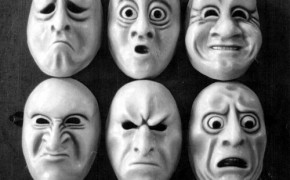This article is adapted from an email response by our very own Master Trader Nikolai to one of our promising pro traders.
The key to trading well is to truly understand and habituate a discrete process – one trade at a time, every trade is for itself.
 Emotions tend to carry-over from one premise to the next (because we are human), but they create an illusion of cause-effect or correlation, when in reality, trades are discrete events…
Emotions tend to carry-over from one premise to the next (because we are human), but they create an illusion of cause-effect or correlation, when in reality, trades are discrete events…
Simple fact, but counter-intuitive to our nature.
That is why trading is often frustrating and makes you doubt your sanity – it creates a fundamental contradiction in you between what you understand and how you feel, when they are both a part of you.
You have to create a paradigm of beliefs that reconciles this contradiction, or fear will remain high (and thus hard to manage), which in turn will never release enough inner confidence for you to manifest a discrete analytic process of quality decision taking.
Some people lean on statistical edges and trust the numbers (my assumption on why Jim Steel is so solid), others prefer to stick to the context and trust the outcome should not disappoint (my way of dealing with it).
Everyone creates their own paradigm, their own way of framing the stress out of the process…
You ask me about the statistics of consistently successful traders. I am not sure you will like my take on it…
Improvement is natural and desired, however, there is a rough reality to accept about the process of growing as a trader (in my experience): there are no “good” traders, because there is no linear continuum from losing money consistently to robbing the market blind…
 It is a curve, where there are 98% of people who bleed money with various speed and there are 2% of “great” traders, who make money all the time (and a lot – a hundred points a month minimum, you make the math in points/contracts)…
It is a curve, where there are 98% of people who bleed money with various speed and there are 2% of “great” traders, who make money all the time (and a lot – a hundred points a month minimum, you make the math in points/contracts)…
There is ALMOST NO middle ground (virtually no “good” traders).
The difference between one group and the other is in the quality of their beliefs, and thus in the ease with which they execute their ideas…
It is a subtle difference and yet it requires not only countless hours of building up context for your intuitive pattern recognition (this alone takes thousands of hours, and still it is just a prerequisite, not even the essential part!), but also reformation of your operative set of beliefs (this is the key to that effortless execution which does not stir your emotions to unmanageable levels with every decision).
For me the bend happened when I truly accepted trading as an exercise of logic, an attempt to understand and perfect my reasoning within an uncertain but logical environment… not an exercise of doubt, hope, chance, or reward I am entitled to because of my efforts…
 I lost money for so long in so many ways that I became disillusioned, almost disgusted, with the naive idea that I will make money simply because I wanted to or worked hard for it…
I lost money for so long in so many ways that I became disillusioned, almost disgusted, with the naive idea that I will make money simply because I wanted to or worked hard for it…
The pain of consistent failure forced me to the humble state of only asking for trading to make sense, not to be rewarding… and that broke the vicious cycle of doubt, hope, fear, anger, disappointment, and struggle…
I realize it is an odd state, a paradoxical one – we do trade for the money after all, right? It is indeed a fallacy, an imperfect state, but it is one that allows for the proper process to take place and thus sets the stage for the results we seek. This uncharted territory in terms of structuring my beliefs about trading transformed charting into a puzzle that always had a solution even if not a readily apparent one (just like all the math problems I’ve been solving since primary school), and execution into an exercise of pressing the keys of the piano according to good practices (an exercise I had habituated over the 15+ years of being a performer).
In short, all I cared about was focusing on the process.
Doubt in my reasoning, in the system, in the vision of having a life and a career as a trader faded in the background and what remained was a dynamic balance between giving my observations a chance to work out (truly assuming the risk of a trade) and allowing for the next premise to come to life when I was inevitably proved wrong on one trade or another.
I truly accepted that being wrong every so often is just as much a part of the process as was being right occasionally! My stress levels went down while my focus and emotional resilience improved. Now I could shake off a loser faster and in time even use it as information to evolve my hypothesis about the market in a constructive way!
My new paradigm turned the tables on the vicious cycle of stressful trading and put me into a constructive one where both successful and unsuccessful trades were useful: the former by improving my confidence,while the latter by improving my market hypothesis.
I got accustomed to this new experience of thinking and trading very quickly, since the results were radically different in a positive way.
I had arrived into what I believe is the optimal mental state for day-trading: detached curiosity.
Keep perfecting your technical skills by challenging yourself to ever greater levels of detail.
Keep practicing your emotional resilience by examining and adjusting your beliefs and your trading process.
Keep things simple, work at one problematic aspect or concept at a time.
Have a quality feedback loop (your logs and your coaches) and listen to it, since you cannot improve at what you are not aware of or what you are not focused on.
Never be destructively critical to your process and never stop working on it.
Read Nikolai’s other very well regarded post on his Trading Demons.


Hi, I just want to know more about trading please help me.
Sign up for our email newsletter at https://daytradingacademy.com
Awesome post. I think its incredible to see the evolution of a someone who’s been saturated by the market for so long. Seems like you acquire and amplify those “trader qualities” until you become something completely different from which you started. Can’t remember how long it took me to actually understand the concept of good decisions vs winning trades. “both successful and unsuccessful trades were useful”. Great read. Really hit home man!